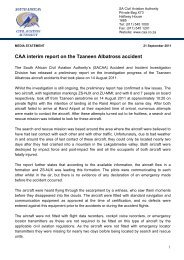FLIGHT INSTRUCTOR GUIDE Aeroplane - South African Civil ...
FLIGHT INSTRUCTOR GUIDE Aeroplane - South African Civil ...
FLIGHT INSTRUCTOR GUIDE Aeroplane - South African Civil ...
You also want an ePaper? Increase the reach of your titles
YUMPU automatically turns print PDFs into web optimized ePapers that Google loves.
(5) At intervals throughout the course, conduct review periods in which no new material<br />
is taught, but reinforcement is obtained.<br />
(6) Attempt to finish lessons with practise of the most important parts of the lesson. This<br />
applies to solo lessons as well as dual exercises. Remember, students practise<br />
knowledge by answering questions and they practise skills by doing.<br />
15. An important skill as a flight instructor is the ability to ask good oral questions. Good oral<br />
questions satisfy all the identified learning factors. The next section of this guide will deal exclusively<br />
with oral questions.<br />
General<br />
ORAL QUESTIONS<br />
1. When presenting a lesson, you have many techniques and aids at your disposal. One aid<br />
that can be used to stimulate learning and effectively applied to satisfy all seven learning factors<br />
is oral questioning .<br />
2. The actual technique of questioning is a difficult one and is normally one of the most<br />
neglected areas of instruction. Good oral questioning requires the ability to think quickly and<br />
easily while facing a class or individual student, to shift and change as thought progresses and<br />
to phrase questions in clear and simple terms. You must always be mindful of the technique to<br />
follow when handling student questions and answers.<br />
Purposes of Oral Questions<br />
3.<br />
(a) First, questions can be used to PROMOTE MENTAL ACTIVITY. You can state a fact and<br />
provide visual or verbal support to back it up but the surest way for students to remember<br />
is working it out for themselves. Whenever you can use an oral question to make your<br />
students think and reason out the fact, you should take advantage of the situation.<br />
Example: As students work towards an objective it is often necessary for them to recall<br />
pertinent data or knowledge learned previously. A well worded oral question could provide<br />
the required information, thus promoting mental activity.<br />
(b) A second purpose of oral questions is to AROUSE AND MAINTAIN STUDENT<br />
INTEREST. Merely making a statement will often result in a "so what" attitude, but asking<br />
questions makes students feel they are participating and contributing to the lesson,<br />
thereby arousing interest. You can maintain this interest throughout the lesson by the<br />
continuous development of facts and ideas. Remember — Telling is NOT teaching.<br />
(c) Another purpose of oral questions is to <strong>GUIDE</strong> THOUGHT. By using questions you can<br />
lead students to think through to a logical solution. Questions can direct students' thinking<br />
through a definite sequence or to particular objectives. During discussions you can use<br />
questions to guide your student's thoughts back to the objective if they seem to be far<br />
afield. An experienced instructor can guide students through an entire lesson by asking<br />
the right questions at the right time.<br />
(d) A final purpose of oral questions is to EVALUATE LEARNING for the benefit of both<br />
instructor and student. Oral questions may be used after each stage of a lesson to ensure<br />
9













